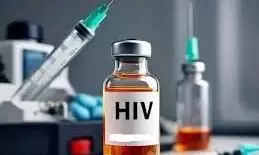
Breakthrough in HIV prevention: lenacapavir injection shows 100% efficacy
text_fieldsA major clinical trial in South Africa and Uganda has demonstrated that a twice-yearly injection of the pre-exposure prophylaxis (PrEP) drug lenacapavir provides complete protection against HIV infection in young women.
The study, led by physician-scientist Linda-Gail Bekker, tested the efficacy of lenacapavir compared to two other daily PrEP pills.
The Purpose 1 trial, sponsored by Gilead Sciences, included 5,000 participants across three sites in Uganda and 25 sites in South Africa.
Lenacapavir, a fusion capsid inhibitor administered biannually, was tested against Truvada (F/TDF) and Descovy (F/TAF), both daily oral PrEP medications. Lenacapavir works by interfering with the HIV capsid, a protein shell essential for the virus's replication.
In the randomized controlled trial, participants were assigned to one of three groups: lenacapavir, F/TDF, or F/TAF. Remarkably, none of the 2,134 women receiving lenacapavir contracted HIV, demonstrating 100% efficacy. In contrast, 16 out of 1,068 women on Truvada and 39 out of 2,136 women on Descovy contracted the virus, translating to infection rates of 1.5% and 1.8%, respectively.
These results prompted an independent data safety monitoring board to recommend ending the trial's "blinded" phase, allowing all participants to choose their preferred form of PrEP. This board ensures trials do not continue if one treatment shows clear superiority or harm.
The success of lenacapavir is a significant breakthrough, offering a highly effective prevention tool against HIV. Despite a decline in new HIV infections globally—from 2 million in 2010 to 1.3 million last year—the current rate is insufficient to meet the UNAIDS target of fewer than 500,000 new infections by 2025 or to end AIDS by 2030.
While PrEP is a crucial prevention tool, it should be combined with other measures like HIV self-testing, condom access, STI screening, and contraception for women. Medical male circumcision should also be promoted for health benefits.
For young people, the daily decision to take a pill or use a condom is often challenging. An injectable PrEP taken twice a year could significantly reduce these barriers, especially for young women facing stigma or difficulty accessing healthcare.
The Purpose 1 trial will continue in an "open label" phase, where participants are informed of their treatment group and can choose their preferred PrEP method. Additionally, the Purpose 2 trial is underway, targeting cisgender men, transgender, and nonbinary individuals who have sex with men.
Gilead Sciences plans to submit the trial results to regulators in Uganda, South Africa, and the World Health Organization (WHO). The hope is that lenacapavir will be integrated into WHO and country guidelines, with affordability ensured through licensing agreements with generic drug manufacturers. This would enable widespread access in the public sector, providing essential protection against HIV for all who need it.























